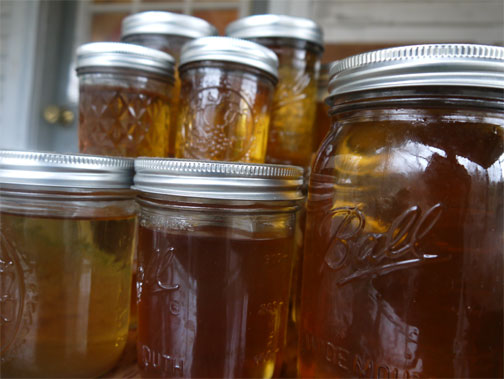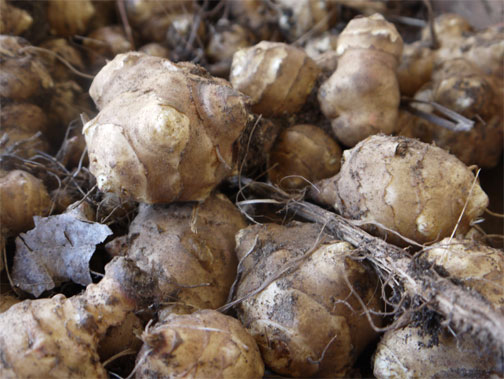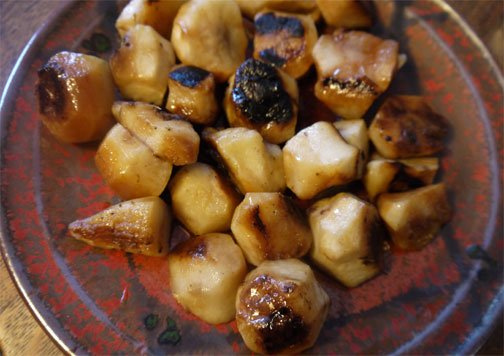 One month into sugaring and still boiling light syrup.
One month into sugaring and still boiling light syrup.
The first harvest is always maple syrup, and no, we haven’t pulled our taps yet. We tapped early in March – on Town Meeting Day (first Monday in March) as is traditional. This year we ended up with 17 taps on 7 trees – more is more. We have almost reached the three-gallon mark and are still boiling light or Grade A. And, it is cold enough to enjoy the added heat from the kitchen stoves.
Last week spring peepers started singing in our neighbor’s pond. We thought that meant the end of sugaring because once the frogs sing, the trees bud. But the cold weather that returned put a stop to all that spring springing, and the sap is flowing like crazy. My son just poked his head in the door and said that he was going to collect. “Hope you like an endless sugaring season,” he said. I do!
 Freshly harvested Jerusalem artichokes.
Freshly harvested Jerusalem artichokes.
Meanwhile, second big sign of spring: Jerusalem artichoke harvest. From our one-pound planting a few years ago, we harvested about ten pounds this year (leaving plenty in the ground to grow for next year’s harvest). Still, it is more than enough to roast and turn into pickles. That’s about the extent of my cooking with Jerusalem artichokes. Sure, they can be made into soups, added to stews, and generally substituted for potatoes or parsnips in any cooked dish. Raw, think of them as a North American jicama and julienne them and dress with lime, or just add their crisp, white flesh to any salad for some bland crunch. They won’t go to waste.
There is going to be a pretty long stretch between now and the first asparagus, so having something to harvest feels pretty good – even if it isn’t the green foods I crave.
 Roasted Jerusalem Artichokes
Roasted Jerusalem Artichokes
Roasted Jerusalem Artichokes
Makes 3 to 4 servings
1 to 2 pounds Jerusalem artichokes
2 tablespoons walnut oil or extra virgin olive oil
Coarse or kosher salt and freshly ground black pepper
1. Preheat the oven to 500° F. Lightly oil a half sheet pan (preferred) or shallow roasting pan large enough to hold the Jerusalem artichokes in a single layer.
2. Peel the artichokes or scrub them well. Cut into 1-inch pieces. Put them on the baking sheet, sprinkle the oil over, and toss with two rubber spatulas until well-coated. Spread out in a single layer.
3. Roast for about 15 minutes, or until the chokes are tender and well-browned, shaking the pan occasionally for even cooking. Shake the pan more frequently toward the end of the roasting time as they will go from well-browned to burned rather quickly. Sprinkle with salt and serve at once.
